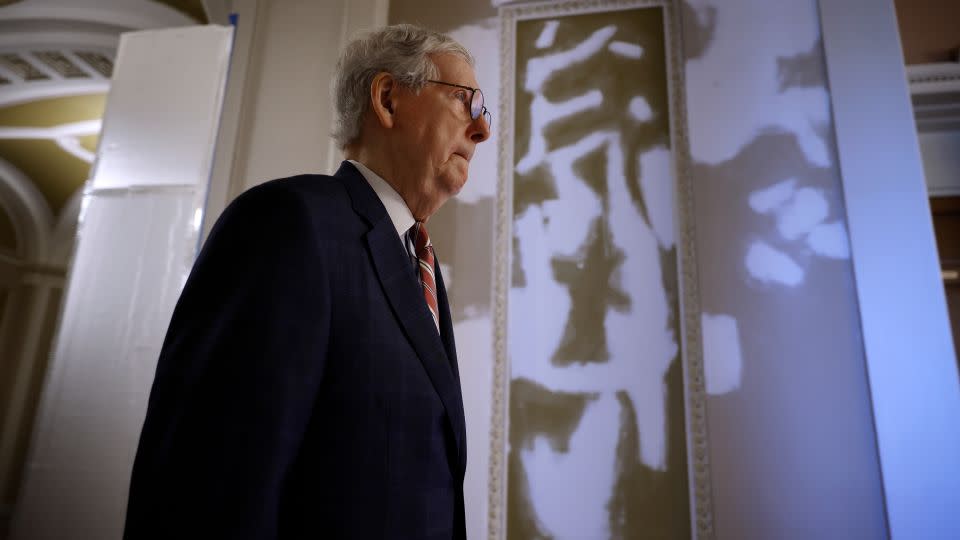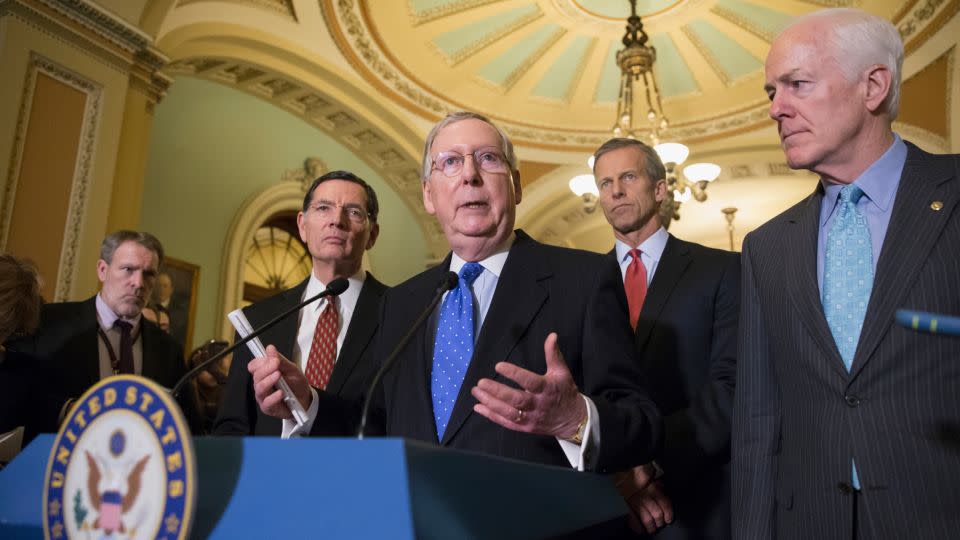Trump poses dilemma for Senate GOP leaders after years of battling with McConnell
Speaker Mike Johnson speaks regularly with former President Donald Trump. One member of his leadership team stumped for Trump in New Hampshire. And all the top House leaders have made crystal clear: They are on Team Trump.
The same can’t be said of Republican leaders across the Capitol.
Senate GOP Leader Mitch McConnell hasn’t spoken to Trump in more than three years and tries to avoid uttering his name in public. His chief deputy and potential successor, John Thune of South Dakota, still hasn’t endorsed Trump and said this month he’s “always been worried” about the down-ticket impact if the former president is nominee. Texas Sen. John Cornyn – another possible future leader who tends to stay out of contested primaries – just backed Trump after his New Hampshire victory, even as he’s raised concerns about his electability in a general election.
And a third potential McConnell successor – Sen. John Barrasso of Wyoming – has taken a different approach, speaking with Trump before he endorsed him days before the Iowa caucuses – as well as planning a fundraiser for Trump-backed Senate candidate Kari Lake in Arizona and fundraising last week for another, Bernie Moreno, in Ohio, according to sources familiar with the matter.
As Trump steamrolls to the nomination, there are ample questions in GOP circles about how – and whether – Trump can rebuild Senate alliances that were critical in his first term but are nonexistent now. The lack of relationship has become abundantly clear in recent days as Trump has publicly and privately lobbied rank-and-file senators and House GOP leaders to kill a major immigration and Ukraine deal that McConnell has worked for months to secure in the Senate.
And if Trump wins in November, Republicans fear a repeat of the chaotic presidency of his first term where carefully coordinated legislative plans could be derailed by the whims of a mercurial president – something that could be even more difficult to manage if tensions remain raw among top Senate Republicans and an emboldened president.
“If we’re in the majority and Donald Trump is the president, there’s got to be a good working relationship there,” said Sen. J.D. Vance, an Ohio Republican and staunch Trump supporter who benefitted from McConnell’s support in his hard-fought win in the 2022 midterms.
Asked if Trump’s ties to the next GOP leader will be a factor as he weighs who to support, Vance said: “Sure.”

McConnell’s uncertain future
Whether McConnell stays as leader – or if any of the “three Johns,” as they’re known in the Capitol – run to succeed him if he steps aside is still unknown.
McConnell, who turns 82 next month, said after his health episodes last year that he would serve out his Senate term, which expires in January 2027. But he has repeatedly refused to say if he would run again to stay as leader, a position he’s held longer than any party leader in the history of the US Senate, fueling speculation that McConnell would give up his leadership post at the end of this Congress.
Sen. Rick Scott of Florida – a McConnell nemesis who unsuccessfully challenged the GOP leader in their last election – would not say whether he would run again for party leader or if he thinks McConnell’s fraught relationship with Trump is a vulnerability.
But Scott did tell CNN: “We’re gonna have a conversation about how we want to be led again, and make a decision.”
Yet while McConnell is facing more dissension within the Senate GOP ranks than he has in his 17 years as GOP leader, interviews with more than a dozen Senate Republicans show that he would likely be able to keep the job as leader — even if Trump wins. And some believe McConnell may choose to run for the job again if Republicans take back the majority as they’re favored to do in November.
“If McConnell chose to stay, I believe McConnell could, and I don’t think any of those three would challenge him,” said Sen. Markwayne Mullin, an Oklahoma Republican, referring to his potential successors.
But Mullin said that the next Senate GOP leader and Trump need to move past the bad blood if they take back the majority and the White House.
“What we can’t have is division between parties if our president is in office,” Mullin said. “We can’t. Whoever it is, we have to have an agreement that we’re working together. If they’re still putting the country first, put your personal beliefs, personal ideas aside.”
Sen. Marco Rubio of Florida – who endorsed Trump over Nikki Haley, despite Haley endorsing him for president in 2016 – said a good working relationship between Trump and their GOP leader was “preferable.”
But he added: “It’s possible, I think, to run the country without people being friends.”
Despite the tension between McConnell and Trump, a number of GOP senators believe that the Kentucky Republican would put his personal feelings aside in order to move an agenda. Whether Trump would do the same is another question.
“They both have some mending to do, I suppose,” said Sen. Kevin Cramer, a North Dakota Republican, noting that Trump has been “reaching out to his former adversaries” to win their support. “Whether Mitch is open to that or not, I don’t know. Mitch is nothing if not pragmatic when it comes right down to it.”
Sen. Thom Tillis, a North Carolina Republican, said it would make no difference to most GOP senators whether the next Republican leader is close with Trump.
“There are going to be people here that are going to be 100% aligned with Trump, some are going to be 100% maybe not (aligned with him),” said Sen. Thom Tillis, a North Carolina Republican who is close to McConnell. “And the rest, the vast majority, are somewhere in the middle. They’re all transactional and gotta work with the president like we did the last time he was president.”
Asked who would be favored to succeed McConnell, Tillis said: “I think you can toss that coin on both sides, to be honest with you.”
McConnell’s critics are much blunter about his challenges ahead.
Sen. Josh Hawley of Missouri, who has been pushing for McConnell’s ouster, said the leader’s frosty relationship with Trump “is not going to be a good thing going forward.”
“You can’t have a Republican leader in the Senate who doesn’t want to work with the president of his own party who’s come to office,” Hawley said.
It didn’t always used to be this way.
Indeed, it was McConnell who was essential to Trump’s biggest accomplishments, namely ushering through three Supreme Court justices whose impact on American society will be felt for generations. The two spoke regularly during Trump’s first term, as the new president put together his Cabinet and a legislative agenda, which included a major overhaul of the tax code.
But after McConnell pointedly blamed the 2021 Capitol attack on Trump in a blistering floor speech, the former president has been on an anti-McConnell rampage. He regularly berates McConnell and has launched a number of racist attacks against his wife, Elaine Chao, a Taiwanese immigrant who served in Trump’s Cabinet but resigned immediately after January 6, 2021.
In the 2022 midterms, when the two men still weren’t talking, McConnell’s team and Trump sparred over Senate candidates – and the GOP leader’s allies ultimately believed that Trump’s late emergence on the campaign trail and hand selection of lackluster candidates cost them the Senate.
McConnell says little about Trump but recently told reporters about his floor speech after the January 6, 2021, attack: “I recently reread it. I stand by what I said.”
Asked by CNN on the day of the New Hampshire primary last week if he’d need to rebuild his relationship with Trump, McConnell flashed a grin and said: “I don’t have any news to make today. We’re all watching New Hampshire with great interest.”

How the ‘Three Johns’ are navigating Trump
McConnell’s successors have taken different approaches to Trump.
After Trump won New Hampshire, Cornyn issued a statement calling for the party to unify behind him and announcing his endorsement. It was the earliest Cornyn has endorsed in a contested presidential primary, according to a source familiar with the Texas Republican’s campaign.
“I think the most important thing we can do is to replace Joe Biden,” Cornyn said.
But even as Cornyn voted with Trump on nearly all of his first-term agenda, the senior senator made clear – as he has for months – that Trump needed to expand his reach beyond his base to win in a general election.
“After a primary, there needs to be a broader appeal than just to primary voters,” Cornyn told CNN. “You can’t win with just your own base.”
After Trump’s victory in New Hampshire, Barrasso – who is up for reelection this year in the deep red state of Wyoming – called the former president the “presumptive nominee.”
Asked about the lack of endorsements from Thune and McConnell, Barrasso said: “I’m certain that Republicans are going to be unified behind President Trump and his effort to beat Joe Biden … and get this country headed in the right direction.”
Thune, however, has taken a different tack, putting him more in line with McConnell. The day after the New Hampshire primary, Thune – who had backed Sen. Tim Scott of South Carolina for president before he dropped out last year - declined to endorse Trump at this point, saying he’d support the nominee no matter who it is. He added that he’d “do what I can to help the team win the presidency.”
Back in December 2020, Thune drew Trump’s ire when he told CNN at the time that the then-president’s efforts to push Congress to overturn his election loss would “go down like a shot dog.” And Thune has repeatedly raised concerns about Trump’s false claims of a stolen election, saying that GOP candidates need to focus on the future.
Asked last week if he could work with Trump as president, Thune said: “We can work with everybody.”
Pressed again if he could do so as GOP leader, Thune said: “Well, that’s a hypothetical.”
And the elevator doors closed.
CNN’s Morgan Rimmer, Lauren Fox and Christine Park contributed to this report.
For more CNN news and newsletters create an account at CNN.com


